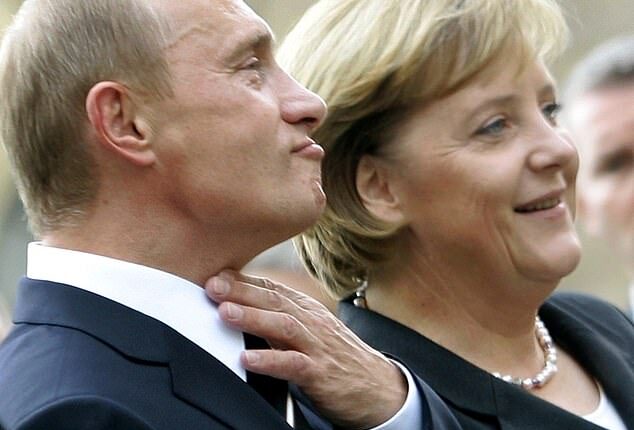Angela Merkel’s explosive claim that Poland is to blame for the war in Ukraine has sparked fury, with European politicians accusing her of having ‘blood on her hands’ and rewarding Moscow’s aggression.
The backlash comes after the former German chancellor claimed Poland and the Baltic states bore responsibility for severing diplomatic ties between Russia and the EU, leading to Vladimir Putin’s invasion in February 2022.
Her controversial comments have garnered condemnation from EU politicians, with many pointing the finger at the 71-year-old for blocking Ukraine’s Nato membership back in 2008 – a move they say emboldened the Russian leader to launch his full-scale invasion years later.
‘Merkel has blood on her hands, she should keep quiet,’ said Polish politician Adam Bielan, a Member of the European Parliament for the Masovian constituency.
He added that the former chancellor is ‘one of the most damaging German politicians’ in recent history, reported German outlet Bild.
The former deputy prime minister of Latvia, Artis Pabriks, joined the chorus of criticism. The publication quoted him saying: ‘Russia alone bears the blame for this aggression.’
He took to social media to voice his opposition to the statements, writing on X: ‘The problem with Merkel’s announcements is that she plays by [the] Kremlin playbook to further [the] Kremlin agenda to split and fragment Europeans, turn[ing] us against each other.’
‘She sounds like Russian influence agent,’ he added.
Meanwhile, Estonian MP Marko Mihkelson said the controversial statements were a ‘new low’ in the Merkel era, casting ‘a shadow over her entire term in office’, Bild reported.
Merkel, who led Germany from 2005 to 2021, made the comments in an interview with Hungarian outlet Partizan.
She has previously defended her record and decision to block Ukraine’s membership into the Western defensive alliance, saying Putin would have interpreted it as a ‘declaration of war’.
Businessman and campaigner Bill Browder also took to X to voice his dismay at Merkel’s comments. ‘No wonder Germany pursued such a disastrous Russia policy under her leadership. Good riddance’ he wrote.

German Chancellor Angela Merkel (R) stands with Russian President Vladimir Putin prior to the two-day ‘German-Russian Petersburg Dialogue’ conference in the city of Dresden October 10, 2006

Angela Merkel’s explosive claim that Poland is to blame for the war in Ukraine has sparked fury, with European politicians accusing her of rewarding Vladimir Putin’s aggression
Merkel, who made German industry dependent on Moscow throughout her time in office by establishing gas pipelines directly linked to Russia, has consistently faced accusations of cosying up to Putin and being too slow to help Kyiv.
Justifying her hesitation surrounding Ukraine’s bid to join Nato in 2008, she said she had no regrets, arguing that Putin’s invasion would have happened a lot sooner if the the country’s membership hadn’t been blocked.
In a recent interview with Partizan, she argued that it was Poland’s refusal to support the Minsk Agreements – a pair of key international agreements between Russia and the EU – that encouraged Putin to properly invade Ukraine in 2022.
Following the secession of Donetsk and Luhansk, two Ukrainian regions that broke away from the country to become what Russia calls its republics, representatives from the two countries and the Organisation for Security and Co-operation in Europe (OSCE) signed the first Minsk agreement in September 2014.
This agreement sought to establish a ceasefire between Russia, Ukraine and the Donetsk People’s Republic (DPR) and Luhansk People’s Republic (LPR).
Merkel claimed that the first Minsk agreement ‘brought about calm’ between 2015 and 2021 and gave Ukraine, which had been defeated by Russia during a summer counter-offensive in 2015 that aimed to take back its land, time to ‘gather strength’ and ‘become a different country’.
The initial agreement didn’t appear to hold any sway with Putin, or his lackeys in Donetsk and Luhansk.
By January 2015, just four months after the first Minsk agreement was signed, Russia and the DPR had engaged in a heavy battle with Ukrainian forces despite the Kremlin’s interests being met.
Minsk II was signed the following month, which also did not prevent further fighting. Between 2015 and 2021, Russian forces had killed or wounded more than 5,000 Ukrainian troops in defiance of the ceasefire agreement.
But Merkel said that it was only by 2021 that she ‘felt that Putin was no longer taking the Minsk Agreement seriously.
‘That’s why I wanted a new format where we could speak directly with Putin as the European Union.
‘Some people didn’t support this. These were primarily the Baltic states, but Poland was also against it’.
She added that these four nations were ‘afraid’ that ‘we wouldn’t have a common policy towards Russia’.
Merkel dismissively added in the interview, which was translated into German and then English: ‘In any case, it didn’t come to fruition. Then I left office, and then Putin’s aggression began.’
It comes as Russian attacks killed at least one civilian and injured at least 33, including children, over the past 24 hours, regional authorities reported on Tuesday.

Ukrainian rescuers work among the rubble at an energy infrastructure facility following a drone attack in Kharkiv on October 7, 2025, amid the Russian invasion of Ukraine

An apartment building heavily damaged during a Russian glide bomb attack two days earlier is seen in Sloviansk amid the Russian invasion of Ukraine, on October 6, 2025

A woman stands near a collapsed building after Russian artillery strikes hit residential areas in the Kherson region of Ukraine on October 6, 2025. Image provided by the Kherson Regional Military Administration
Moscow launched 152 unmanned aircraft, including around 80 Shahed-type strike drones, as well as two Iskander-M or KN-23 ballistic missiles overnight, according to the Ukrainian Air Force.
Some 88 drones were intercepted by Ukrainian air defenses, while two missiles and 52 drones struck 10 locations.
At least five civilians died after Russia launched drones, missiles and guided aerial bombs at Ukraine on Saturday night into Sunday, in a major attack that officials there said targeted civilian infrastructure.
Moscow fired 53 ballistic and cruise missiles and 496 drones, Ukraine’s air force said. President Zelensky reported that nine regions were targeted.
Four people, including a 15-year-old, died in a combined drone and missile strike on Lviv, according to regional officials and Ukraine’s emergency service.
It was the largest aerial assault on the historic western city and surrounding region since Russia’s full-scale invasion on February 24, 2022, according to Maksym Kozytskyi, head of the local military administration. Earlier in the war, Lviv was seen as a haven from the fighting and destruction farther east.
In a Telegram post, Kozytskyi said Russia launched about 140 Shahed drones and 23 ballistic missiles across the region.
At least six more people were injured, according to a statement by Ukraine’s police force.








